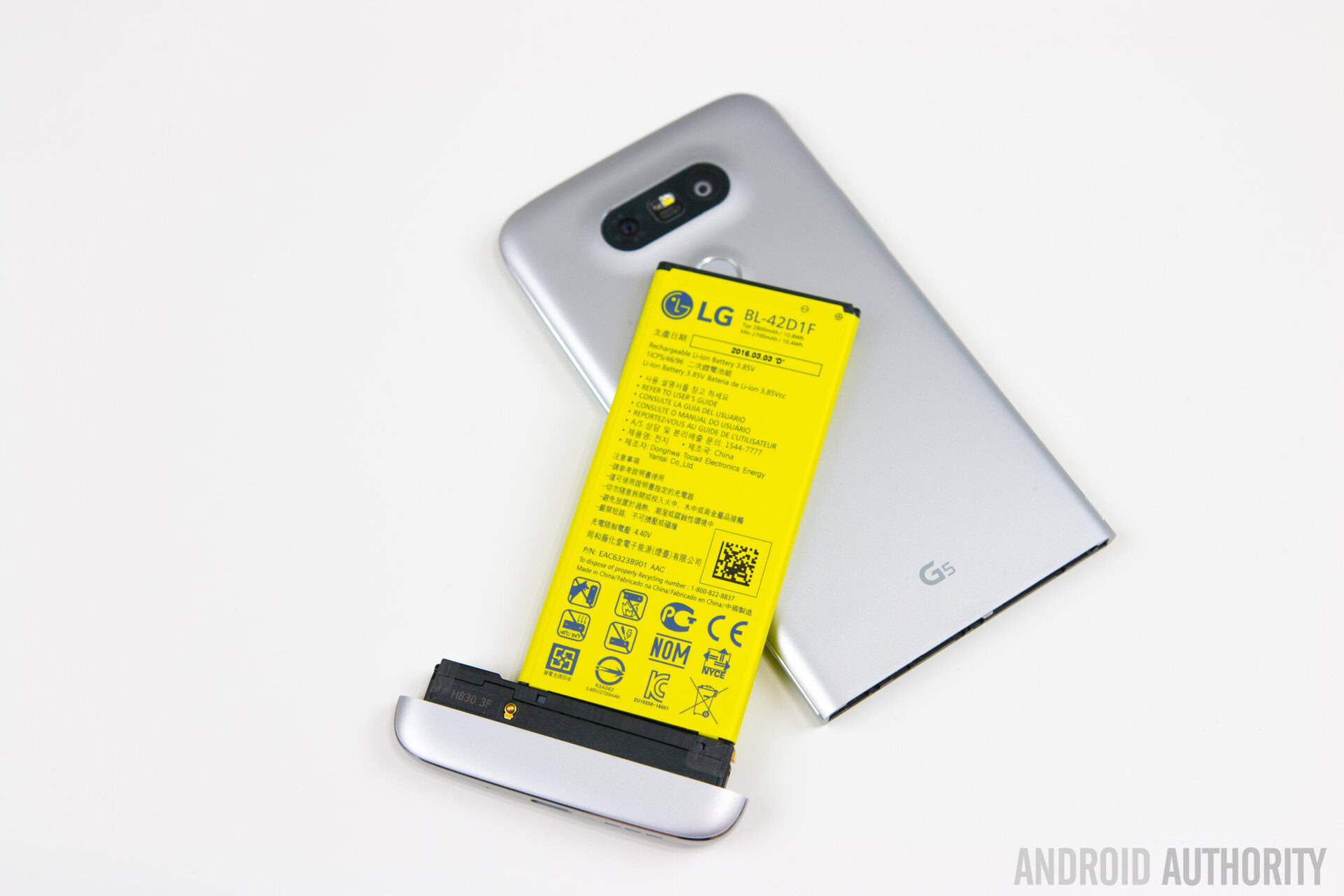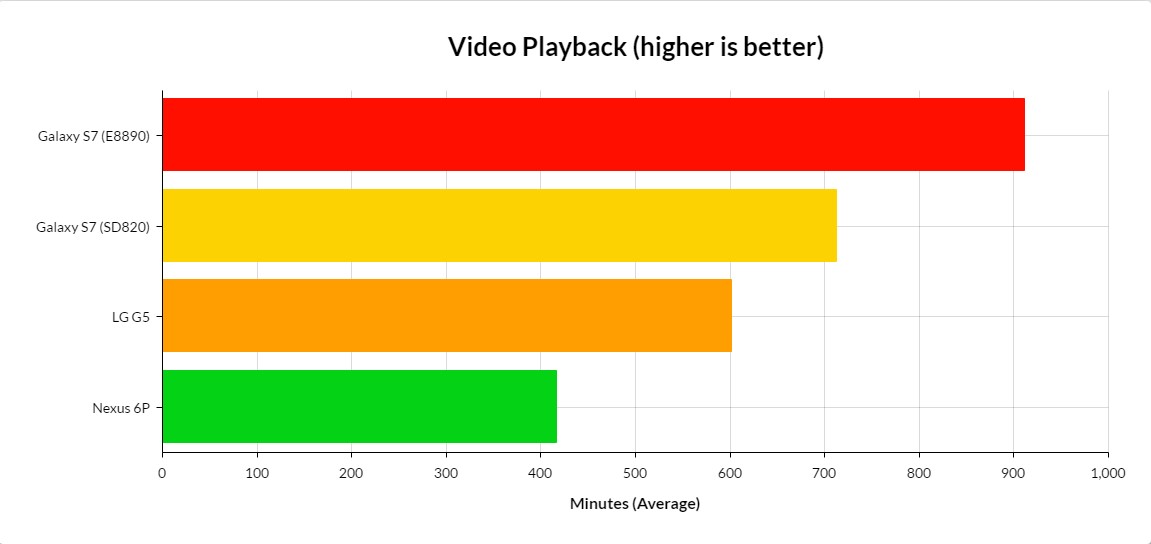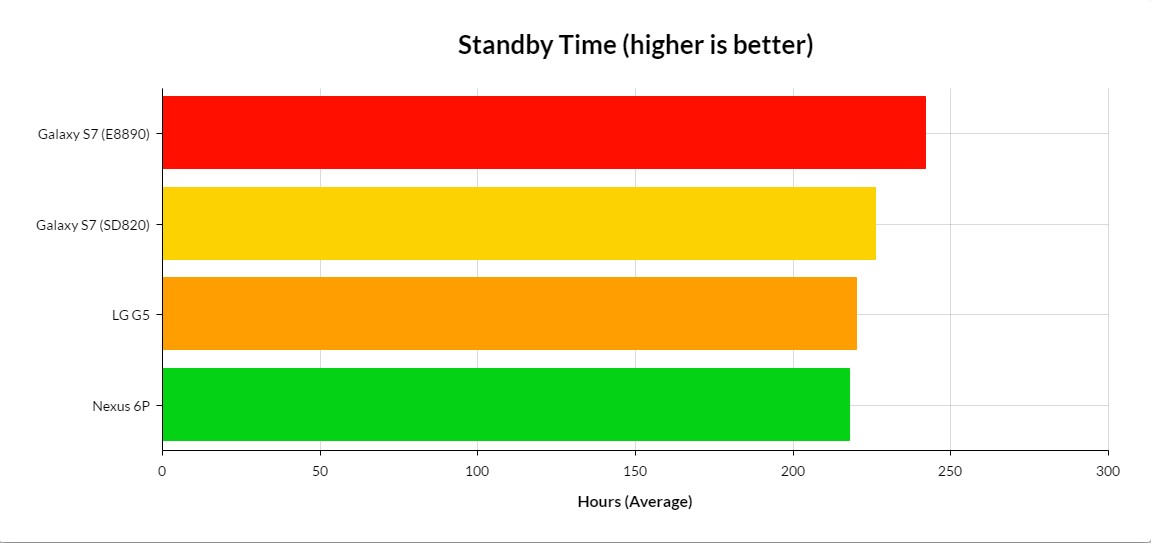Affiliate links on Android Authority may earn us a commission. Learn more.
LG G5 battery life review
Published onApril 21, 2016

While its past G-series flagships have been small evolutionary upgrades on previous handsets, this year LG revolutionised its flagship with a modular-toting battery-replaceable metal design.
Yet, change doesn’t always mean for the better, and while there’s a lot of great things going for the LG G5, the redesign of the LG G5 means the battery has shrunk slightly from 3000mAh unit packed inside the LG G4 and LG G3 to a 2800mAh unit, which is still removable. Do the efficiencies of a new processor and Doze Mode in Marshmallow deliver enough to satisfy the power-hungry, or does the G5 fall short?
- LG G5 Review
- Feature Focus: LG G5 camera
- Feature Focus: LG G5 modules and peripherals
- Feature Focus: LG G5 CAM Plus
LG G5 Battery vs the LG G3
How does the LG G5 battery life stack up to the competition? Join us to find out in this, our LG G5 battery life review.
In the review below, we’ve compared the data from our LG G5 testing versus both versions of the Galaxy S7 and also compared it to Google’s flagship, the Nexus 6P. In the graphs below, (E8890) and (SD820) denote the Exynos and Snapdragon versions of the Galaxy S7 respectively.
WiFi Browsing Test
To kick off our testing, we charged the LG G5 to full, removed the charger and ran our custom WiFi browsing test tool at full brightness until the battery drained to 0. We then recharged the phone, and recorded the Screen on Time recorded by the Android OS. During the test, the LG G5 was placed 3 metres from the WiFi router it was connected to and syncing of accounts and data had been switched off.

In this test, the LG G5 scores an average Wi-Fi browsing battery life of 5 hours and 34 minutes. By way of comparison, this is lower than the Snapdragon powered Galaxy S7 (6 hours 30 minutes), the Exynos Galaxy S7 (6 hours 48 minutes) and the Nexus 6P (6 hours 37 minutes).
Video Playback Test
From WiFi browsing to video playback and again, we tested from full to empty. Looping the same 5-minute video over and over on each of these handsets, we ran the test at 50% brightness and then recharged the phone to get the screen on time listed by the Android OS. During the test, each device was put in airplane mode to prevent any syncing or connections preventing the video from playing.

In this test, the LG G5 scores a video playback battery life score of 10 hours and 2 minutes, which, while respectable again, does pale in comparison to the competition. Interestingly, the LG G5 continues the trend started in the first test of offering approximately 15 to 20% lower battery life than the Snapdragon powered Galaxy S7, which has a battery that is approximately 7% larger and scores 11 hours and 52 minutes.
Standby Test
Our third and final test involves testing the longevity of each handset, as an indicator of the maximum standby life. Each smartphone was charged to full and WiFi was turned on with the same set of apps syncing data and notifications (11 apps in total). After exactly 24 hours, the remaining battery life was measured and this data used to extrapolate the total potential battery life.

Standby testing is somewhat subjective as it will vary slightly between devices, even with the same set of apps syncing. In actual usage, standby time can vary widely but with the limited testing we’ve conducted, we can see the LG G5 achieves a standby battery life of 9 days and 4 hours. This is again, slightly lower than the Snapdragon Galaxy S7 but higher than the larger battery inside the Google Nexus 6P.
Real world usage
Testing under these conditions isn’t always indicative of day-to-day usage, where variables such as network coverage, usage of other apps and more, can all impact the actual battery life offered by a smartphone. To this effect, does the battery life live up to its billing above?
From a couple of weeks’ worth of usage, I’d say the battery life is somewhat on par with the data captured in our testing. Standby time is pretty good and with low usage, you can easily expect the G5 to last between two and three days. The real trouble comes with medium to heavy usage, where the battery life is somewhat of a let down. The maximum we’ve achieved is 4 hours’ screen on time, which is average compared with the 5-6 hours offered by the Galaxy S7. In fact, with the much more affordable Xiaomi Mi 5 able to also score between 5 and 6 hours, the G5’s battery is quite disappointing in actual usage.
Quite interestingly, the LG G5 does seem to offer 20 percent lower battery than the Snapdragon powered Galaxy S7, despite the battery only being 7 percent smaller. Whether this is down to Samsung’s per-app battery saving feature in TouchWiz is unclear but the data certainly provides food for thought and is something to keep in mind if trying to decide between these two smartphones.
Wrap Up
The first thing to note when considering the data above is that we’re using an T-Mobile US branded LG G5, and the few preloaded apps may have a small impact on battery life. That being said, there’s no denying that, although you can swap the battery inside the LG G5, it certainly isn’t on par with other flagships.
[related_videos title=”LG G5 in video:” align=”right” type=”custom” videos=”685451,684693,684690,676936,676155,675613″]For heavy users in particular, the battery life may be a concern and for anyone but a light user, we’d probably suggest keeping a spare battery. And there in lies the G5’s biggest advantage – although a lot of smartphones do support quick charge, the fastest way to go from an empty battery to a full one is by swapping it out.
Consider that a removable battery is almost an extinct beast and the LG G5 is even more impressive for the heavy user; LG deserves plaudits for sticking to its guns about offering a removable battery and as long as you don’t mind splashing out for a spare battery, the LG G5 battery life won’t be a concern.
Will the update to Android N in a few months offer significant battery life advantages? What do you think of the LG G5 battery life and if you have one, what battery life have you experienced? Let us your findings in the comments down below!